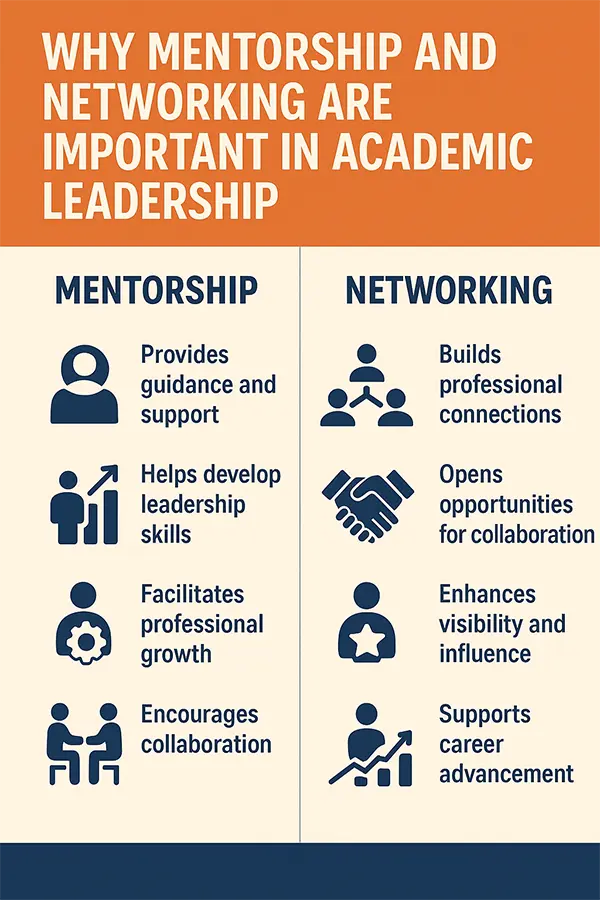
KEY TAKEAWAYS
- Decisions made by academic ladders have a direct impact on the teachers and students.
- Further exploring new roles in your field maintains your interest.
- Skills like conflict resolution, decision-making, strategic thinking, etc., are a must for leadership.
- Mentorship and networking go side by side and are a must for every leader.

It doesn’t come as a shock that there are over, by 2030, there will be over 44 million teachers worldwide. Education is one of the most important sectors in the world, and the people who work in it are directly responsible for the better future of the country.
Academic leaders like the President, Dean, or Department Chair are significant individuals who ensure that the task force is functioning well. To obtain optimal results, they need to have leadership qualities, but how can they achieve them?
In this article, I’ll mention how to build a career in academic leadership and what things you have to do if you want to be the best. Let’s get started.
Why Academic Leadership Matters in Today’s World
Academic leadership is crucial for many things. Decisions made by those who are in authority have a direct impact on all the students and teaching staff. Academic leadership is crucial for fostering student growth, ensuring equity and inclusion, driving innovation, and maintaining institutional sustainability in a rapidly changing world.
The policies that are created determine how the teachers are going to deliver the lessons, where the resources are going to be used, and how they’ll respond to any challenges. Community trust is also maintained if the academic leadership is on point, and it also helps with obtaining strategic direction.
Recognizing the Right Time to Move Beyond Teaching
There are times when teachers slowly start to lose in teaching. It becomes a loop for them, and they just don’t want to be in it anymore. When you begin to lack passion, experience constant burnout, feel undervalued, or plateau in your professional growth, it may be time for you to move beyond just being a teacher. By this, I don’t mean that you should just leave your job and pursue something else.
If it’s something you’ve always been devoted to, you can start exploring other things. You can start mentoring recruits or come up with new ideas to improve the existing internal policies. You can get a new qualification like EdD. But again, a question arises: Is an EdD worth it? The simpler answer is yes, it is.
Exploring Key Roles in Academic Leadership
When the word “academic leadership” is used, the first position that comes to mind is that of the principal. But is that the most important person? No, a principal for sure, a main figure, but they are not everything. As a matter of fact, on every level of education, there is a person who has been assigned a certain responsibility.
They are responsible for setting vision and strategy, fostering teaching and learning, driving research and scholarship, managing human resources and culture, and overseeing resources/ operations. Every individual who is in charge shares one common trait, and that is influencing others and guiding change.
Developing the Skills That Make Leaders Effective
A good resume might look appealing, but academic leadership requires more than that. There is a certain set of skills that are required, even if you are experienced, but don’t have these skills, you wouldn’t be fit for the role.
Conflict resolution, decision-making, strategic thinking, and emotional intelligence are some of the major skills that a person requires to be a great leader. To develop these qualities, you would need real-life experience and study various case studies so that you can later come up with your own ideas and solutions to overcome hurdles.
The Role of Mentorship and Networking
In education, mentorship is everything. It provides personalized guidance, skill development, and emotional support, which you would need if you are going to be surrounded by students. On the other hand, networking builds broad connections for opportunities and diverse perspectives.
When you become part of any educational institute, it’s common to attend conferences, workshops, and online forums. Here, networking becomes crucial, as you’ll have to interact with others and get new contacts that could be beneficial in the future. Below, you can see why networking and mentorship are important skills.

The Impact of Technology on Educational Leadership
It’s an era where technology has become the core of every operation, and educational leadership has also been greatly impacted by it. Now, leaders can make data-driven decisions, foster enhanced communication, and collaborate with stakeholders.
Various software and programs make repetitive tasks like checking test papers, grading, and distributing study material easier than ever. Teachers can also keep tabs on the progress of every student and curate personalized content that will help them get better and get good grades.
Common Challenges Leaders Face—and How to Overcome Them
Academic leaders do come across various challenges, but with some quick and smart thinking, they can overcome them easily. Usually, they face communication gaps, heavy workloads and stress, managing diverse teams, conflict resolution, and a lack of formal leadership training.
Creating a career in academic leadership requires change, partnerships, and perseverance. Leaders face resistance to change, changing policies, and limited resources while trying to lead productive learning environments.
Educators can use their education, mentorship, and experiences in education to move out of the classroom and into positions to lead educational change, policy, culture, and student success for good in education.
Ans: In simple language, academic leadership is no less than a skill that keeps an educational institution running and achieves the best possible results.
Ans: Purpose, people, process, performance, and personal attributes are said to be the five P’s of leadership. These are the things that every leader should have.
Ans: A good academic leader will be good at communicating things, articulate a clear vision, and have excellent emotional intelligence.